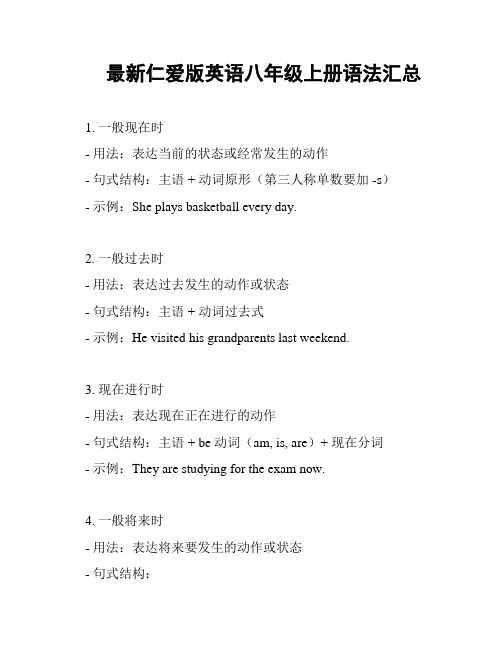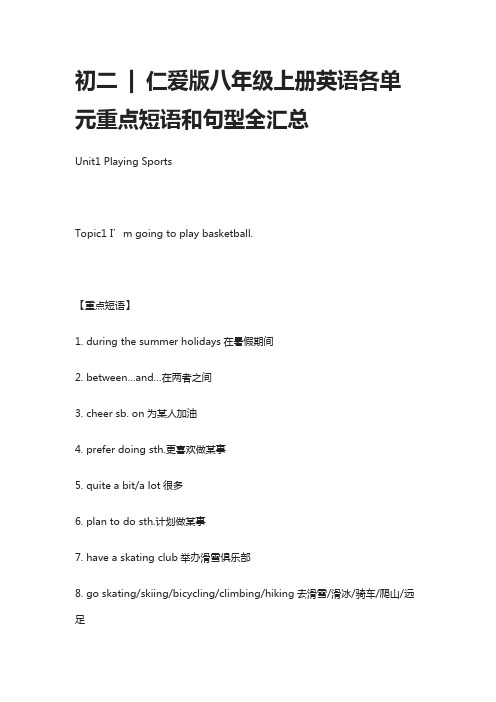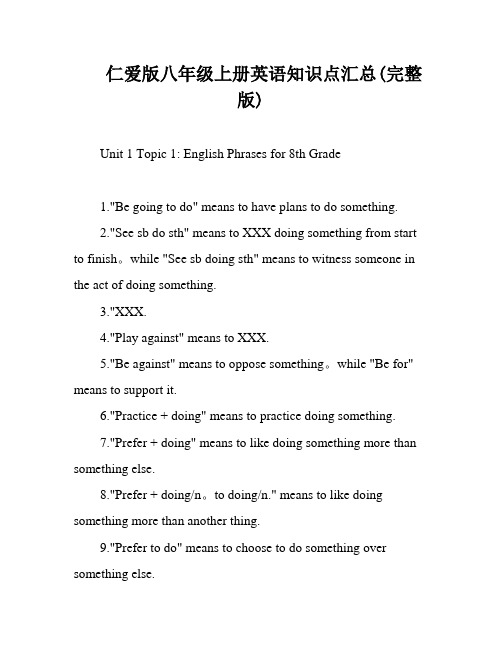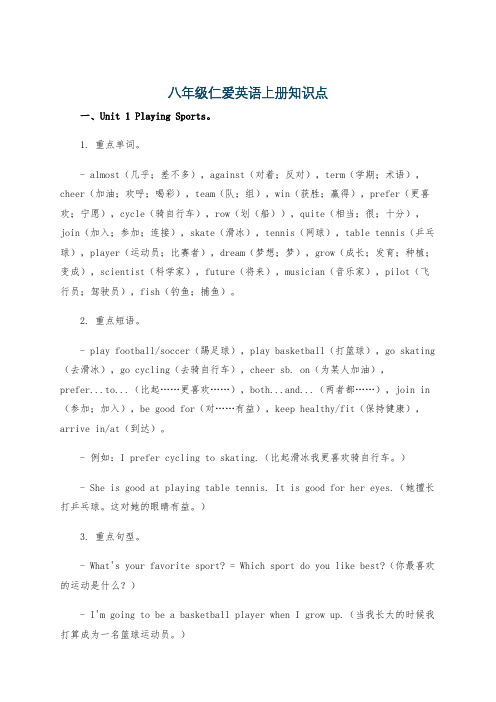仁爱版八年级英语上册语法
英语仁爱版八年级上册笔记

英语仁爱版八年级上册笔记一、重点词汇1. almost /ˈɔːlməʊst/ adv. 几乎,差不多-例句:It's almost time to go. 差不多该走了。
2. few /fjuː/ adj. 很少的;几乎没有的pron. 很少- a few 一些;几个-例句:I have few friends here. 我在这里几乎没有朋友。
3. health /helθ/ n. 健康;卫生- healthy /ˈhelθi/ adj. 健康的-例句:Eating fruits is good for your health. 吃水果对你的健康有好处。
4. difference /ˈdɪfrəns/ n. 不同;差异;区别- different /ˈdɪfrənt/ adj. 不同的-例句:There are many differences between the two pictures. 这两张图片有很多不同之处。
5. important /ɪmˈpɔːtnt/ adj. 重要的- importance /ɪmˈpɔːtns/ n. 重要性-例句:It's important to learn English well. 学好英语很重要。
二、重点短语1. look after 照顾;照料-例句:You should look after your younger sister. 你应该照顾你的妹妹。
2. keep healthy 保持健康-例句:We should eat more fruits and vegetables to keep healthy. 我们应该多吃水果和蔬菜来保持健康。
3. be different from 与……不同-例句:My bike is different from yours. 我的自行车和你的不同。
4. a few days later 几天后-例句:He came back a few days later. 几天后他回来了。
最新仁爱版英语八年级上册语法汇总

最新仁爱版英语八年级上册语法汇总
1. 一般现在时
- 用法:表达当前的状态或经常发生的动作
- 句式结构:主语 + 动词原形(第三人称单数要加 -s)
- 示例:She plays basketball every day.
2. 一般过去时
- 用法:表达过去发生的动作或状态
- 句式结构:主语 + 动词过去式
- 示例:He visited his grandparents last weekend.
3. 现在进行时
- 用法:表达现在正在进行的动作
- 句式结构:主语 + be 动词(am, is, are)+ 现在分词
- 示例:They are studying for the exam now.
4. 一般将来时
- 用法:表达将来要发生的动作或状态
- 句式结构:
- 主语 + will + 动词原形(肯定句)
- 主语 + won't + 动词原形(否定句)
- Will + 主语 + 动词原形?(疑问句)
- 示例:I will finish my homework later.
5. 现在完成时
- 用法:表达过去发生的但与现在相关的动作或状态
- 句式结构:主语 + have/has + 过去分词
- 示例:She has already eaten lunch.
以上是最新仁爱版英语八年级上册的语法汇总。
语法知识的掌握对于学习英语非常重要,希望以上内容能帮助你更好地理解和应用语法规则。
如果有任何疑问,请随时向我提问。
仁爱版初二八年级上册英语各单元重点短语和句型全汇总

初二| 仁爱版八年级上册英语各单元重点短语和句型全汇总Unit1 Playing SportsTopic1 I’m going to play basketball.【重点短语】1. during the summer holidays在暑假期间2. between…and…在两者之间3. cheer sb. on为某人加油4. prefer doing sth.更喜欢做某事5. quite a bit/a lot很多6. plan to do sth.计划做某事7. have a skating club举办滑雪俱乐部8. go skating/skiing/bicycling/climbing/hiking去滑雪/滑冰/骑车/爬山/远足9. arrive in/at到达10. play against…与……对抗/较量11. for long很久12. leave for…动身去…13. the day after tomorrow后天14. China’s national team中国国家队15. play baseball打棒球16. at least至少17. What a shame! 多羞愧!18. be good at善于做某事19. take part in参加20. all over the world全世界21. be good for对……有益22. a good way一种好方法23. keep fit/healthy保持健康24. relax oneself放松某人自己【重点句型】1. What’s your favorite sport? = What sport do you like best? 你最喜爱的运动是什么?2. Which sport do you prefer? = Which sport do you like better?你更喜欢什么运动?I prefer skating. = I like skating better. 我更喜欢滑雪.3. Do you skate much? = Do you often skate? 你常滑雪吗?4. She spends at least half an hour in the gym every day. 每天她至少花半小时在体育馆.5. She plays baseball pretty well and she is also good at jumping. 她棒球打得相当好而且擅长于跳.6. What kind of sports do you like? = Which sport do you like? 你喜欢哪种运动?7. Would you like to come and cheer us on? 你愿意来为我们加油吗?8. What are you going to be when you grow up? 当你长大后做什么?9. There is going to be a school sports meet next month.下月有一场运动会。
仁爱版英语八年级上册短语归纳

仁爱版英语八年级上册短语归纳一、学校生活1. 学科相关短语:Chinese literature 语文课math class 数学课English lesson 英语课science lab 科学实验室physical education class 体育课art class 美术课computer class 计算机课2. 课堂活动短语:take notes 做笔记ask questions 提问give a presentation 做报告do homework 做作业revise lessons 复习功课prepare for exams 准备考试3. 学校设施短语:library 图书馆canteen 食堂playground 运动场gymnasium 体育馆classroom building 教学楼dormitory building 宿舍楼4. 学校生活实例:“I usually take notes in class to help me revise later.”“After school, I often go to the libra ry to borrow books.”“On Fridays, we have a computer class where we learn to program.”二、家庭与朋友1. 家庭成员短语:family members 家庭成员parents 父母siblings 兄弟姐妹grandparents 祖父母uncles and aunts 叔叔阿姨2. 家居生活短语:clean the house 打扫房间cook meals 做饭watch TV 看电视do the laundry 洗衣服have dinner 吃饭3. 与朋友交往短语:make friends 交朋友hang out with friends 和朋友闲逛visit friends 拜访朋友introduce sb. to sb. 把某人介绍给某人go shopping 购物4. 家庭与朋友实例:“On weekends, I usually help my mother clean the house.”“After school, I often hang out with my best friend at the park.”“During holidays, I visit my grandparents in the countryside.”三、休闲活动1. 体育活动短语:play basketball 打篮球go swimming 游泳cycle 骑自行车go hiking 远足do yoga 做瑜伽2. 娱乐活动短语:watch movies 看电影listen to music 听音乐read books 读书play computer games 玩电脑游戏draw pictures 画画3. 休闲活动实例:“On Sundays, I like to go swimming with my family.”“Before bedtime, I usually read a book to relax.”“During breaks, my friends and I often play basketball on the court.”四、健康与身体1. 健康习惯短语:exercise regularly 规律锻炼eat healthily 健康饮食get enough sleep 保证充足睡眠drink plenty of water 多喝水avoid junk food 避免垃圾食品2. 身体状况短语:feel ill 感觉不舒服have a headache 头痛have a fever 发烧cough 咳嗽have a toothache 牙痛3. 健康与身体实例:“To stay healthy, I exercise regularly and eat a balanced diet.”“When I feel ill, I usually go to the doctor for advice.”“After running, I always make sure to stretch to prevent muscle pain.”五、节假日与庆祝1. 节假日短语:Spring Festival 春节Mid-Autumn Festival 中秋节National Day 国庆节Christmas 圣诞节New Year's Eve 除夕2. 庆祝活动短语:celebrate a festival 庆祝节日give gifts 送礼物have a party 举行派对light fireworks 放烟花make a wish 许愿3. 节假日与庆祝实例:“During Christmas, we usually have a tree in the house and give presents to each other.”“On Mid-Autumn Festival, families gather together to eat mooncak es and admire the moon.”“Before the New Year, we clean the house and put up red couplets to celebrate.”六、自然与环境1. 自然现象短语:sunny day 晴天rainy day 雨天windy day 风天snowy day 雪天thunderstorm 雷雨2. 环境保护短语:protect the environment 保护环境reduce waste 减少浪费recycle resources 回收利用资源plant trees 植树save water 节约用水3. 自然与环境实例:“On sunny days, I like to go for a walk inthe park and enjoy the nature.”“To protect the environment, I always try to recycle paper and plastic.”“During rainy season, we need to be careful ab out flooding and take necessary precautions.”七、科技与创新1. 科技产品短语:computer 电脑smartphone 智能手机tablet 平板电脑laptop 笔记本电脑robot 机器人2. 创新活动短语:do research 做研究invent something 发明某物use technology 使用科技create a new product 创造新产品improve technology 改进技术3. 科技与创新实例:“With the help of computers, students can learn more efficiently.”“Many companies are now using robots toautomate production lines.”“Scientists are always trying to invent new technologies to improve people's lives.”八、文化与艺术1. 文化活动短语:celebrate culture 庆祝文化attend a concert 参加音乐会watch a drama 看戏剧visit a museum 参观博物馆learn a language 学习语言2. 艺术创作短语:paint a picture 画画write a poem 写诗dance 跳舞play a musical instrument 演奏乐器act in a play 演戏3. 文化与艺术实例:“Last weekend, I visited the art museum and saw many beautiful paintings.”“My younger sister loves to dance, and she takes classes every week.”“As part of our culture, we celebrateChinese New Year with family and friends.”仁爱版英语八年级上册短语归纳总结,旨在帮助学生系统回顾和巩固所学短语,通过丰富的实例加深理解和记忆。
英语八年级上册语法知识点仁爱版

英语八年级上册语法知识点仁爱版一、一般现在时1. 概念:表示经常发生的动作或存在的状态。
2. 构成:动词原形或第三人称单数形式。
3. 用法:表示经常性、习惯性的动作或存在的状态,也表示现在的特征或状态。
如:He often helps his mother do the housework. 他经常帮他妈妈做家务。
4. 特殊用法:表示主语具备的性格和能力,也可以表示客观事实或普遍真理。
如:She can sing this song in English. 她能用英语唱这首歌。
二、现在进行时1. 概念:表示正在进行的动作或存在的状态。
2. 构成:be动词(am/is/are)+动词的现在分词形式(-ing)。
3. 用法:表示正在进行的动作或存在的状态,强调的是正在发生的事情。
如:They are studying in the classroom. 他们在教室里学习。
4. 特殊用法:表示将来发生的动作,也可以表示过去发生的动作。
如:He is coming to see you tomorrow. 他明天要来看你。
(表示将来) They were having a meeting at this time yesterday. 昨天这个时候他们在开会。
(表示过去)三、现在完成时1. 概念:表示已经完成的动作或存在的状态,对现在产生的影响或结果。
2. 构成:have/has + 过去分词。
3. 用法:表示过去发生的动作已经完成,对现在产生的影响或结果。
如:I have finished my homework. 我已经完成了我的作业。
4. 特殊用法:可以表示发生在过去的动作延续到现在,也可以表示过去发生的动作与现在的状态有关。
如:He has lived here since 2000. 他从2000年就住在这里了。
(表示过去的动作延续到现在)They have been married for five years. 他们结婚已经五年了。
仁爱版八年级上册英语知识点汇总(完整版)

仁爱版八年级上册英语知识点汇总(完整版)Unit 1 Topic 1: English Phrases for 8th Grade1."Be going to do" means to have plans to do something.2."See sb do sth" means to XXX doing something from start to finish。
while "See sb doing sth" means to witness someone in the act of doing something.3."XXX.4."Play against" means to XXX.5."Be against" means to oppose something。
while "Be for" means to support it.6."Practice + doing" means to practice doing something.7."Prefer + doing" means to like doing something more than something else.8."Prefer + doing/n。
to doing/n." means to like doing something more than another thing.9."Prefer to do" means to choose to do something over something else.10."Quite a lot/bit" means often.11."Which" means "what kind of," while "prefer" means "like better."12."XXX," "XXX," "Take part in + activity/XXX," and "Be in + activity/XXX" all mean to participate in something.13."Know about" means to be aware of or understand something.14.In a time clause。
仁爱英语八年级上册笔记整手写

仁爱英语八年级上册笔记整手写一、Unit 1 Playing Sports。
(一)Topic 1 I'm going to play basketball.1. 重点单词。
- almost: 几乎,差不多。
例如:It's almost time for lunch.- against: 对着,反对。
常用短语play against,如:Our team will play against theirs.- cheer: 加油,欢呼。
cheer sb. on为某人加油,例如:We will cheer our players on.- prefer: 更喜欢,相当于like...better。
prefer sth. / prefer doing sth. / prefer to do sth.,例如:I prefer apples. I prefer reading books. I prefer to go for a walk.2. 重点句型。
- What are you going to do? (be going to结构表示打算、计划做某事)- I'm going to play basketball.- Which sport do you prefer, cycling or rowing?- I prefer rowing.- Do you row much? (这里的much表示“经常”,用于疑问句和否定句中)3. 语法。
- be going to的用法。
- 构成:be(am/is/are)+ going to+动词原形。
- 用法:表示主观打算做某事或根据某种迹象表明即将发生某事。
例如:Look at the clouds. It's going to rain.(根据乌云这一迹象判断即将下雨)(二)Topic 2 Would you mind teaching me?1. 重点单词。
八年级仁爱英语上册知识点

八年级仁爱英语上册知识点一、Unit 1 Playing Sports。
1. 重点单词。
- almost(几乎;差不多),against(对着;反对),term(学期;术语),cheer(加油;欢呼;喝彩),team(队;组),win(获胜;赢得),prefer(更喜欢;宁愿),cycle(骑自行车),row(划(船)),quite(相当;很;十分),join(加入;参加;连接),skate(滑冰),tennis(网球),table tennis(乒乓球),player(运动员;比赛者),dream(梦想;梦),grow(成长;发育;种植;变成),scientist(科学家),future(将来),musician(音乐家),pilot(飞行员;驾驶员),fish(钓鱼;捕鱼)。
2. 重点短语。
- play football/soccer(踢足球),play basketball(打篮球),go skating (去滑冰),go cycling(去骑自行车),cheer sb. on(为某人加油),prefer...to...(比起……更喜欢……),both...and...(两者都……),join in (参加;加入),be good for(对……有益),keep healthy/fit(保持健康),arrive in/at(到达)。
- 例如:I prefer cycling to skating.(比起滑冰我更喜欢骑自行车。
)- She is good at playing table tennis. It is good for her eyes.(她擅长打乒乓球。
这对她的眼睛有益。
)3. 重点句型。
- What's your favorite sport? = Which sport do you like best?(你最喜欢的运动是什么?)- I'm going to be a basketball player when I grow up.(当我长大的时候我打算成为一名篮球运动员。
- 1、下载文档前请自行甄别文档内容的完整性,平台不提供额外的编辑、内容补充、找答案等附加服务。
- 2、"仅部分预览"的文档,不可在线预览部分如存在完整性等问题,可反馈申请退款(可完整预览的文档不适用该条件!)。
- 3、如文档侵犯您的权益,请联系客服反馈,我们会尽快为您处理(人工客服工作时间:9:00-18:30)。
仁爱版八年级英语上册语法UNIT 1 Topic 1 语法精讲be going to +动词原形1. 表示说话人根据现在已有的迹象,判断将要或即将发生某种情况。
这类句子的主语可以是人,也可是物。
例如:There is going to be a football match in our school tomorrow afternoon. 明天下午我们学校将有一场足球赛。
(已有告示)I feel terrible.I think I'm going to die. 我感到难受极了,我想我快不行了。
Look at those black clouds!It's going to rain. 看看那些乌云!天快要下雨了。
2. 表示主语现在的意图或现已作出的决定,即打算在最近或将来进行某事。
这种意图或决定往往是事先经过考虑的。
例如:He isn't going to see his elder brother tomorrow. 他明天不准备去看他哥哥。
Mary is going to be a teacher when she grows up. 玛丽决定长大了当一名教师。
3. 只是单纯地预测未来的事,此时可与will互换。
例如:2I think it is going to/will rain this evening. 我认为今晚要下雨。
注意:(1)be going to和will在含义和用法上略有不同。
be going to往往表示事先经过考虑的打算;will 多表示意愿、决心。
两者有时不能互换。
例如:He is studying hard and is going to try for the exams. 他正努力学习,准备参加考试。
(不能用will 替换)—Can somebody help me?——谁能帮我一下吗?—I will. ——我来。
(不能用be going to替换)(2)在if之后,通常不用will表示预言,但可以用be going to表示意图。
例如:If you are going to go to the cinema this evening,you'd better take your coat with you. 你若今晚去看电影,最好带着外套。
be going to也常可以用于主句之中。
例如:If you invite Jack,there's going to be trouble. 如果你邀请杰克,那就要惹麻烦了。
如果表示将来的意愿,will可用于条件从句。
此时will为情态动词。
例如:If you will learn to play football,I'll help you.3如果你想学踢足球,我可以帮你。
课堂小测1、Be careful. The train ____d.A. will comeB.C. comesD. is coming2. Look at those clouds. It ___a__ soon, I'm afraid.A. is going to rainB. is rainingC. will rainD. won't rain3. The radio says it ____c__ the day after tomorrow.A. is going to snowB. is snowingC. will snowD. snows4. _b___ he _____ some shopping tomorrow afternoon ?A. Will…doesB. is going to doC. is…doingD. Shall… do4UNIT 1 Topic 2 语法精讲5UNIT 1 Topic 3 语法精讲6随堂测试1、There __________ a meeting tomorrow afternoon.A. will be going toB. will going to beC. is going to beD. will go to be( ) 2. Charlie ________ here next month.A. isn’t workingB. doesn’t workingC. isn’t going to workingD. won’t work( ) 3. He ________ very busy this week, he ________ free next week.A. will be; isB. is; isC. will be; will beD. is; will be( ) 4. There ________ a dolphin show in the zoo tomorrow evening.A. wasB. is going to haveC. will haveD. is going to be7( ) 5. –_____ you ______ free tomorrow? – No.I _____ free the day after tomorrow.A. Are; going to; willB. Are; going to be; willC. Are; going to; will beD. Are; going to be; will be( ) 6. Mother ________ me a nice present on my next birthday.A. will givesB. will giveC. givesD. giveUNIT 2 Topic 1 语法精讲8UNIT 2 Topic 2 语法精讲9UNIT 2 Topic 3 语法精讲情态动词用法总结:情态动词的语法特征:1)情态动词不能表示正在发生或已经发生的事情,只表示期待或估计某事的发生;2)情态动词除ought 和have 外,后面只能接不带to 的不定式。
3)情态动词没有人称,数的变化,即情态动词第三人称单数不加-s。
4)情态动词没有非谓语形式,即没有不定式,分词,等形式。
一、比较can 和be able to101)can could 表示能力;可能(过去时用could),只用于现在式和过去式(could)。
be able to可以用于各种时态。
They will be able to tell you the news soon. 他很快就能告诉你消息了。
2)只用be able toa. 位于助动词后。
b. 情态动词后。
c. 表示过去某时刻动作时。
d. 用于句首表示条件。
e. 表示成功地做了某事时,只能用was/were able to,不能用could。
He was able to flee Europe before the war broke out.He managed to flee Europe before the war broke out.注意:could不表示时态1)提出委婉的请求,(注意在回答中不可用could)。
—— Could I have the television on?—— Yes, you can. / No, you can't.2)在否定,疑问句中表示推测或怀疑。
He couldn't be a bad man.他不大可能是坏人。
二、比较may和might1)表示允许或请求;表示没有把握的推测;may 放在句首,表示祝愿。
May God bless you!He might be at home.注意:might 表示推测时,不表示时态。
只是可能性比may 小。
2)成语:may/might as well,后面接不带to 的不定式,意为"不妨"。
If that is the case, we may as well try三、比较have to和must1) 两词都是'必须’的意思,have to 表示客观的需要, must 表示说话人主观上的看法,既主观上的必要。
My brother was very ill, so I had to call the doctor in the middle of the night. 我弟弟病得很厉害,我只得半夜里把医生请来。
(客观上需要做这件事)He said that they must work hard. 他说他们必须努力工作。
(主观上要做这件事)2) have to有人称、数、时态的变化,而must 只有一种形式。
但must 可用于间接引语中表示过去的必要或义务。
He had to look after his sister yesterday.3)在否定结构中: don't have to 表示"不必"mustn't 表示"禁止",You don't have to tell him about it. 你不一定要把此事告诉他。
You mustn't tell him about it. 你一定不要把这件事告诉他。
四、must表示推测1) must用在肯定句中表示较有把握的推测,意为"一定"。
2) must表对现在的状态或现在正发生的事情的推测时, must 后面通常接系动词be 的原形或行为动词的进行式。
You have worked hard all day.You must be tired. 你辛苦干一整天,一定累了。
(对现在情况的推测判断)He must be working in his office. 他一定在办公室工作呢。
比较:He must be staying there. 他现在肯定呆在那里。
He must stay there. 他必须呆在那。
3) must 表示对已发生的事情的推测时,must要接完成式。
I didn't hear the phone. I must have been asleep. 我刚才没有听到电话,我想必是睡着了。
4) must表示对过去某时正发生的事情的推测,must 后面要接不定式的完成进行式。
——Why didn't you answer my phone call?——Well, I must have been sleeping, so I didn't hear it.5) 否定推测用 can't。
If Tom didn't leave here until five o’clock, he can't be home yet. 如果汤姆五点才离开这儿,他此时一定还未到家。
